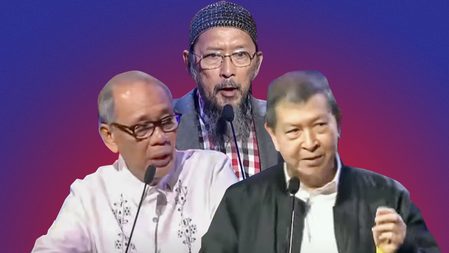SUMMARY
This is AI generated summarization, which may have errors. For context, always refer to the full article.
![[OPINION] We should change the way political debates are handled](https://www.rappler.com/tachyon/2022/03/Screen-Shot-2022-03-08-at-3.21.19-PM.png)
(Disclaimer: The views, thoughts, and opinions expressed in the commentary belong solely to the author, and not to the National Society of Parliamentarians, Inc.)
Imagine an audience of rabid supporters – drowning their voices in a sea of inaudible names and celebratory remarks. In front, a tightly lit stage where personalities stand and sing their cheers on how their presence has helped millions. Some may describe this to be a concert. But for most politically active citizens, a political debate comes to mind.
Political debates, especially those held during election season, theoretically ensure that candidates provide the voters accurate information on their platforms and plans should they be elected. These events act as the level playing field towards a fair and informed electorate under the guise of transparency. However, this is not always the case.
Streaming live from the set to our mobile devices, presidential and senatorial debates vary in their structure, operations, and duration. What remains constant, however, are three factors: audience, spectacle, and format. All these should change.
First, the attendees of these political rallies are supporters and yeasayers cheering the candidate on in true viva voce fashion. A raised fist only fuels the fire of roars and screams befitting a tired citizenry hungry for real change. However, cues, as heard from a live audience, may influence those who have yet to decide.
In a study by political psychologists, they argue that audience reactions produce significant shifts in both the performance of the presidential candidate and the social influence of voters (Fein, Goethals, and Kugler, 2007). Thus, indirect participation in a debate will make or break a candidate’s prospect for victory. This said, parties may try to pack every nook with supporters to ensure that their candidates fill most studio audience seats. Vox populi, vox Dei.
Second, televised debates are almost always broadcast through the power of television. In the Philippine media context, networks are niche territories. Similar to that of American print journalism, syndication is not an alternative for major outlets. As such, news divisions scramble to provide primetime coverage for soundbites and worthy pick-up lines that swoon voters to the polls.
The 2016 presidential elections drew the highest turnout in three decades. While this might be on account of increased political participation, it remains personality-oriented and media-driven (Holmes, 2016). To counter this, albeit gradually, is to consider argument-driven rhetoric that bases competency not on headlines and bits but on candidate statements that are factual, sound, and character-driven.
While the first suggestion may help curb this, it might help to include academicians, men and women of science, and even ordinary citizens into the picture, similar to a CNN Town Hall. This assures people that moderators are not inadvertently stealing the spotlight from the candidates but are mere facilitators of discourse – the content of which should come from those who seek public office.
Lastly, the format. Interruptions by a candidate happen at an alarming rate. Hot mics run around the studio’s hot lights. In an almost-showdown fashion, none could understand either candidate overpowering each other through volume and not content.
During the second US presidential debate in 2020, the US Commission on Presidential Debates announced that they would mute the opponent’s microphones while it is not their time. Could this be done too for the Philippines? In 2016, then-candidate Duterte swept audiences’ feet (back at it again) using well-crafted soundbites on drugs, criminality, and the West Philippine Sea – all these remarks he made as he interrupted others.
As we approach the 2022 elections, the Commission on Elections (Comelec) is set to conduct a series of presidential and vice-presidential debates. While the law does not provide for mandatory attendance of candidates, a Comelec-organized debate amid a pandemic is an opportune time for all candidates to specify their platforms instead of generating cheers from a live audience.
I’m reminded of an episode in The West Wing, probably my favorite political drama, where Democratic candidate Santos and Republican foe Vinnick went head-to-head in a debate I only wish could be done anywhere. However, debate rules are in place for a reason, and if it doesn’t work out (as it has not been for decades), then maybe it is high time we change it.
Current debate formats do not work – especially in the time of a pandemic. As COVID ensues, organizations leading debates should spatially maximize studios; packing them with undecideds and swing voters who will scrutinize rather than cheer on candidates. In order to educate voters, substance should reign over swoons. Networks should maximize content from all candidates without sacrificing (air)time. To turn off microphones for those who have yet to speak may be a good addition, too.
Within the milieu of social media and viral content, presidential debates should stand above the rest. It must uphold a neutral and informative platform for candidates to be heard without the spectacle of an entertainment show.
Emphasis on presidential or senatorial debates in the Philippines should be avenues of persuasiveness and logos, not fallacies and inaccurate figures. While waiting for the polls to open in 2022, we must have an informed electorate capable of choosing their candidates based on competency and transparency. If only political debates can facilitate that. – Rappler.com
Jaconiah Shelumiel T. Manalaysay is Chair and Chief Executive Officer of the National Society of Parliamentarians, Inc., a non-stock, non-profit network of parliamentarians and policy advocates in the country.
Add a comment
How does this make you feel?


![[WATCH] In The Public Square with John Nery: Preloaded elections?](https://www.rappler.com/tachyon/2023/04/In-the-Public-Square-LS-SQ.jpg?resize=257%2C257&crop=414px%2C0px%2C1080px%2C1080px)
![[Newspoint] 19 million reasons](https://www.rappler.com/tachyon/2022/12/Newspoint-19-million-reasons-December-31-2022.jpg?resize=257%2C257&crop=181px%2C0px%2C900px%2C900px)

![[OPINION] The long revolution: Voices from the ground](https://www.rappler.com/tachyon/2022/06/Long-revolution-June-30-2022.jpg?resize=257%2C257&crop=239px%2C0px%2C720px%2C720px)
![[OPINION] I was called a ‘terrorist supporter’ while observing the Philippine elections](https://www.rappler.com/tachyon/2022/06/RT-poster-blurred.jpeg?resize=257%2C257&crop_strategy=attention)
There are no comments yet. Add your comment to start the conversation.